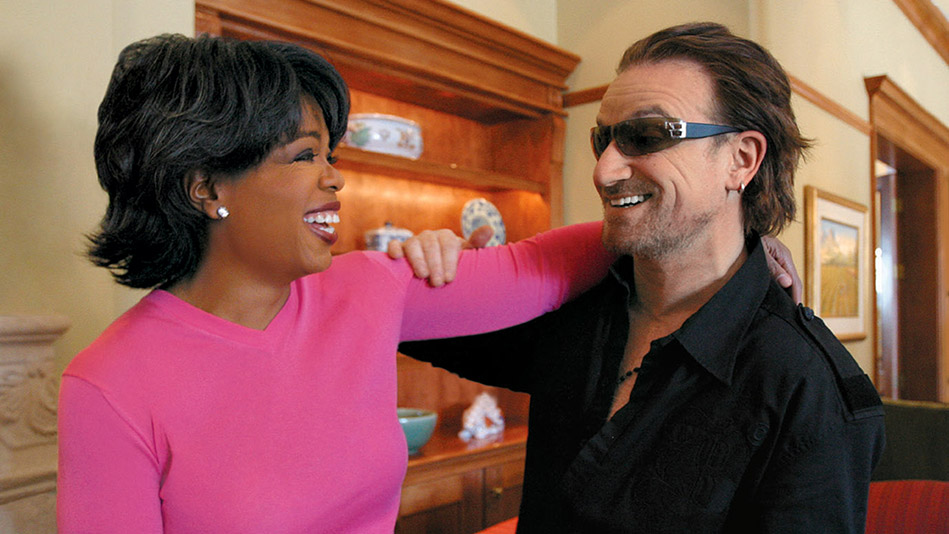Oprah Talks to Bono

Photo: Benny Gool
He's the cooler-than-cool rocker, the legendary front man of U2, husband of 22 years and father of four who's singing his heart out to shine light on a crisis devastating a continent.
By the time the sun sets this evening, AIDS will have claimed the lives of 6,500 more people in Africa. Before you finish this sentence, another mother, father or child will succumb to the virus. We've all heard the numbers, shaken our heads at the horror and moved on to whatever we had to do next. Bono, on the other hand, takes the AIDS epidemic personally."Our generation will be remembered for the Internet, for the war against terror and for how we let an entire continent burst into flames while we stood around with watering cans—or not," he said when I sat down with him on my show. He compared the situation to watching Holocaust victims being put on trains while the rest of the world did nothing. Determined to take action, Bono launched a nonprofit organization, DATA (Debt, AIDS, Trade, Africa). One of DATA's goals is to reduce African debt, which would free up billions of dollars for healthcare and education. Who else could have used rock 'n' roll to get us to feel the impact of Third World economics?
I caught up with Bono again in Cape Town, South Africa, after he'd given a riveting performance in conjunction with World AIDS Day. Born Paul Hewson to a Protestant mother and a Catholic father in 1960 in Dublin, this man with a social conscience and a contagious fervor makes being a pop star a part-time job. When we talked in Chicago, he left me with his own blue wraparound sunglasses—such a hot gift. This time he left me with an even greater treasure—his wisdom. We talked about everything from songwriting to raising kids to working to save Africa. I have the ultimate admiration and respect for him.
Oprah: How does the music come to you? Quincy Jones once told me that he can sometimes see melodies.
Bono: I've never seen the music. For me it's a puzzle. I hear strains of a melody, and only when I work it out to its end can I be at peace. Until then it's like a twitch.
Oprah: I got it.
Bono: It just comes out. No choice. It's sort of embarrassing because it happens when you don't really want it to. You're writing a song on the back of an Air India sick bag, and you're not writing it because you need a hit—you're writing it because you need some sleep. You have to put it on paper so you can quiet the nagging.
Oprah: Can you set out to write a hit and then actually write one?
Bono: Well, one of the things that hits have and that great music always has, you know—the music feels like it was already there.
Oprah: Like your song "Beautiful Day."
Bono: I don't know if that's great. But when you stumble on certain melodies, you think, That was already there.
Oprah: It's like what Michelangelo said: The sculpture was already in the stone.
Bono: And I don't think he was just being clever. The hit—what might be called eternal music, if you want to be high-minded—is a song that most people feel familiar with. And the most extreme end of that spectrum is music...
Oprah: ...that resonates on a level that's indescribable.
Bono: Right. Like "I've got sunshine on a cloudy day." Or my favorite song, "Amazing Grace." My second favorite song is "Help Me Make It Through the Night." What I like about pop music, and why I'm still attracted to it, is that in the end it becomes our folk music. In the seventies, when we were growing up and all the rock criticism was going on, disco was supposed to suck. But you listen to some of that music now—"I Will Survive"...
Oprah: And the Donna Summer stuff.
Bono: Yes. It's like folk music now. That other stuff with the guitar solos? Who cares? The great music for so many artists—the Beatles, the Rolling Stones—was always at the moment when they were closest to pop. It would be easy for U2 to go off and have a concept album, but I want us to stay in the pop fray.
Oprah: Do you have anxiety every time you release an album?
Bono: Yes.
Oprah: You do?
Bono: Of course. It's much easier to be successful than it is to be relevant. The tricks won't keep you relevant. Tricks might keep you popular for a while, but in all honesty, I don't know how U2 will stay relevant. I know we've got a future. I know we can fill stadiums. And yet with every record, I think, Is this it? Are we still relevant?
Oprah: Well, you haven't been invited to play a Bat Mitzvah yet.
Bono: No. I just don't want to go through what I call the Interesting Music Phase. That really means "We just don't get it."



